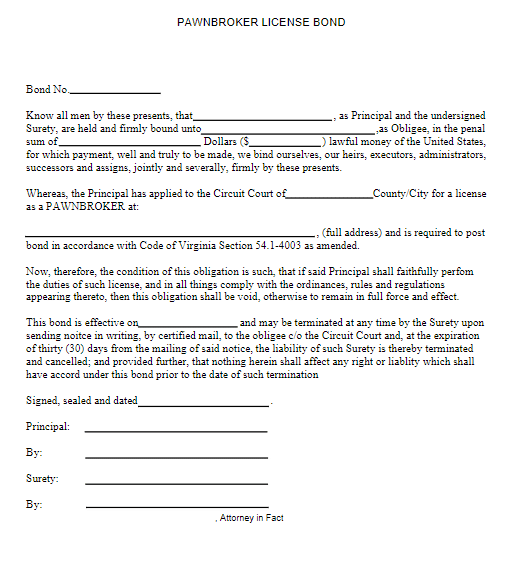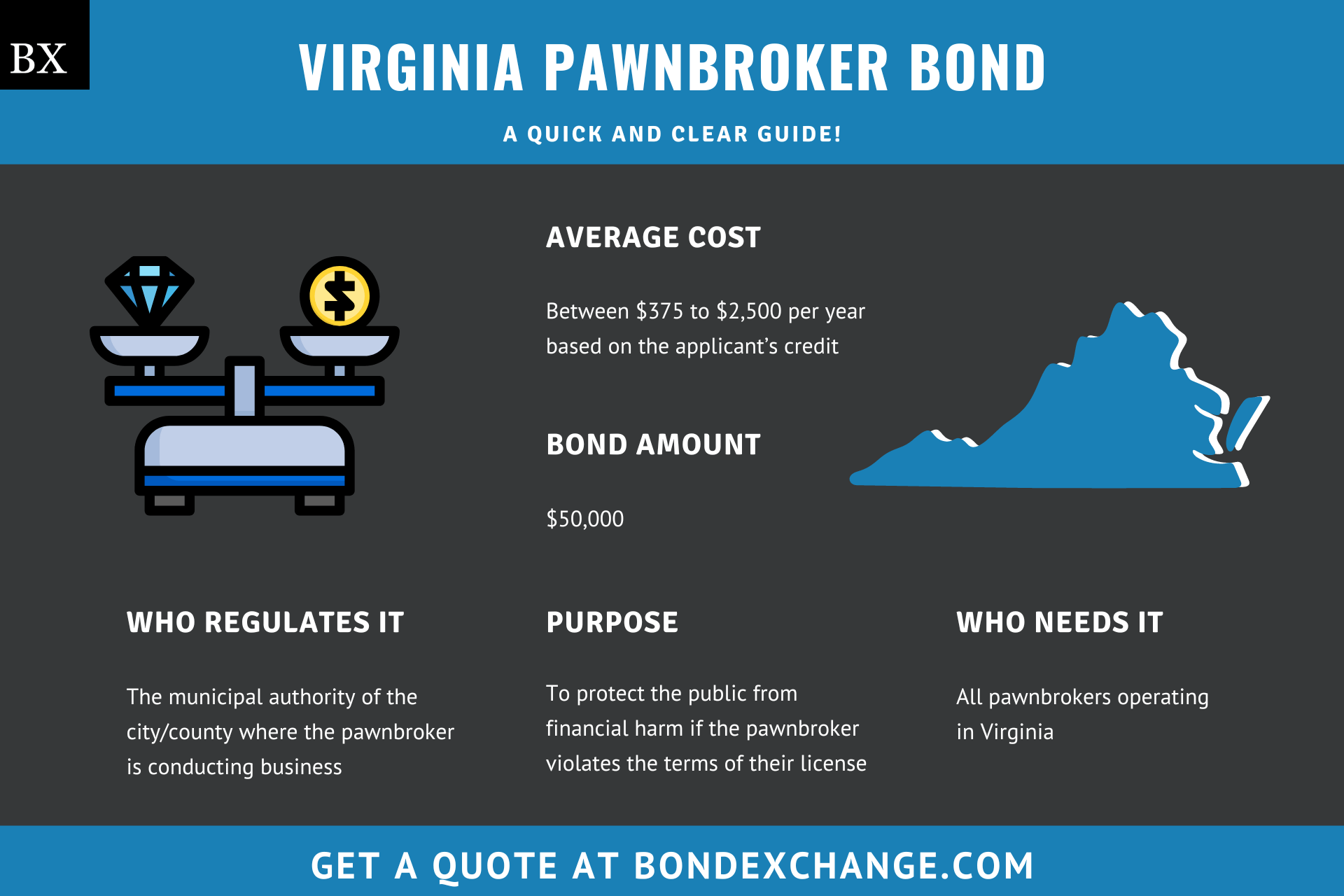Virginia Pawnbroker Bond: A Comprehensive Guide
This guide provides information for insurance agents to help their customers obtain a Virginia Pawnbroker bond.
At a Glance:
- Lowest Cost: $375 per year or $37.50 per month, based on the applicant’s credit
- Bond Amount: $50,000
- Who Needs it: All pawnbrokers operating in Virginia
- Purpose: To protect the public from financial harm if the pawnbroker violates the terms of their license
- Who Regulates Pawnbrokers in Virginia: The municipal authority of the city/county where the pawnbroker is conducting business

Background
Virginia Code 54.1-4001 requires all pawnbrokers operating within the state to obtain a license from their local municipal authority. The Virginia legislature enacted the licensing requirement to ensure that pawnbrokers engage in ethical business practices. To provide financial security for the enforcement of the licensing law, pawnbrokers must purchase and maintain a $50,000 surety bond to be eligible for a license.
Virginia Code 54.1-4002 dictates that city and county governments may limit the number of pawnbroker licenses that can be issued, so all pawnbrokers must first obtain approval from their local circuit court before applying for a license.
What is the Purpose of the Virginia Pawnbroker Bond?
Virginia requires pawnbrokers to purchase a surety bond as part of the application process to obtain a pawnbroker license. The bond ensures that the public will be protected from financial harm if the broker fails to comply with the regulations set forth in Virginia Code 54.1-4003. Specifically, the bond protects the public in the event the broker engages in any acts of fraud or breaches consumer contracts. In short, the bond is a type of insurance that protects the public if the pawnbroker violates the terms of their license.
How Can an Insurance Agent Obtain a Virginia Pawnbroker Surety Bond?
BondExchange makes obtaining a Virginia Pawnbroker bond easy. Simply log in to your account and use our keyword search to find the “Pawnbroker” bond in our database. Don’t have a login? Gain access now and let us help you satisfy your customers’ needs. Our friendly underwriting staff is available by phone at (800) 438-1162, email, or chat from 7:30 AM to 7:00 PM EST to assist you.
At BondExchange, our 40 years of experience, leading technology, and access to markets ensures that we have the knowledge and resources to provide your clients with fast and friendly service whether obtaining quotes or issuing bonds.
Not an agent? Then let us pair you with one!
Click the above image to find a BX Agent near you
Is a Credit Check Required for the Virginia Pawnbroker Bond?
Surety companies will run a credit check on the applicant to determine eligibility and pricing for the Virginia Pawnbroker bond. Applicants with excellent credit and work experience can expect to receive the best rates. Applicants with poor credit may be declined by some surety companies or pay higher rates. The credit check is a “soft hit”, meaning that the credit check will not affect the applicant’s credit.
How Much Does the Virginia Pawnbroker Bond Cost?
The Virginia Pawnbroker bond can cost anywhere between $375 to $2,500 per year or $37.50 to $250 per month. Insurance companies determine the rate based on a number of factors including your customer’s credit score and experience. The chart below offers a quick reference for the approximate bond cost on the $50,000 bond requirement.
$50,000 Pawnbroker Bond Cost
| Credit Score* | Bond Cost (1 Year) | Bond Cost (1 month) |
|---|---|---|
| 800+ | $375 | $37.50 |
| 625 – 799 | $500 | $50 |
| 600 – 624 | $1,250 | $125.50 |
| 575 – 599 | $1,500 | $150 |
| 500 – 574 | $2,500 | $250 |
*The credit score ranges do not include other factors that may result in a change to the annual premium offered to your customers, including but not limited to, years of experience and underlying credit factors contained within the business owner’s credit report.
Who is Required to Purchase the Virginia Pawnbroker Bond?
Virginia requires pawnbrokers to purchase a surety bond as a prerequisite to obtaining a pawnbroker license. To paraphrase Virginia Code 54.1-4000, a pawnbroker is a person who issues loans to individuals that leave their property, as collateral, for the broker to sell on condition that the customer may repurchase the property within a fixed period of time.
BondExchange now offers monthly pay-as-you-go subscriptions for surety bonds. Your customers are able to purchase their bonds on a monthly basis and cancel them anytime. Learn more here.
How Do Pawnbrokers Apply for a License in Virginia?
Pawnbrokers in Virginia must navigate several steps to obtain a license and must obtain a separate license for each pawn shop location they operate. Below are the general guidelines, but applicants should refer to the licensing statutes for details on the process.
License Period – All Virginia Pawnbroker Licenses expire one year from the date of issuance and must be renewed before the expiration date
Step 1 – Contact Your Local Circuit Court
All pawnbrokers interested in obtaining a pawnbroker license must first obtain approval from the circuit court in their local city or county. The circuit courts in Virginia limit the number of pawnbroker licenses issued in each city or county, so pawnbrokers must petition the court for approval before applying for a license. Pawnbrokers will obtain a court order if approved, and most cities or counties will complete a background check at this time. A list of circuit courts in Virginia can be found here.
Step 2 – Contact Your Local Municipal Authority
After obtaining a court order, pawnbrokers must contact their city or county’s local licensing authority. The municipal authority will walk them through the application process, provide them with all required forms, and answer any questions they may have. All Virginia Pawnbroker License applications must contain, at a minimum, the following items:
-
- The name and address of the applicant and those of their business
- A valid, unexpired form of picture identification
- A statement on the applicant’s criminal background history
- Proof of the court order issued by the circuit court
All applicants that have been convicted of a felony or crime involving moral turpitude within the past ten years are ineligible for licensure.
Step 3 – Purchase a Surety Bond
Pawnbrokers operating in Virginia are required to purchase and maintain a $50,000 surety bond.
How Do Virginia Pawnbrokers Renew Their Licenses?
Pawnbrokers should contact their local municipal authority to obtain a renewal application before their license expires. Brokers must also ensure they renew their surety bond to avoid the termination of their license. All Virginia Pawnbroker Licenses are valid for one year from the date of issuance and must be renewed before the expiration date.
What are the Insurance Requirements for Virginia Pawnbrokers?
Virginia does not require pawnbrokers to purchase any form of liability insurance. However, pawnbrokers must purchase and maintain a $1,000 surety bond.
How Do Virginia Pawnbrokers File Their Bonds?
Pawnbrokers should submit their completed bond forms, including the power of attorney, to their local municipal authority.
The surety bond requires signatures, including witness signatures, from both the surety company that issues the bond and from the broker. The surety company should include the following information on the bond form:
- Legal name and business address of the entity/individual(s) buying the bond
- Surety company’s name
- Name and city/county of the obligee
- Bond amount
- Date the bond goes into effect
- Date the bond is signed
What Can Virginia Pawnbrokers do to Avoid Claims Made Against Their Bonds?
To avoid claims on their bonds, pawnbrokers in Virginia must ensure that they:
- Do not engage in any acts of fraud or misrepresentation
- Do not breach contracts made with consumers
- Maintain all required transaction records
- Obtain proof of identification during each transaction
What Other Insurance Products Can Agents Offer Pawnbrokers in Virginia?
Virginia does not require pawnbrokers to obtain any liability insurance. However, most reputable businesses will purchase liability insurance. Bonds are our only business at BondExchange, so we do not issue any other types of insurance, but our agents often utilize brokers for this specific line of business. A list of brokers in this space can be found here.
How Can Insurance Agents Prospect for Virginia Pawnbroker Customers?
Virginia unfortunately does not provide a public database of active pawnbrokers in the state. However, we suggest contacting local municipal authorities for a list of licensed pawnbrokers within that city/county. Contact BondExchange for additional marketing resources. Agents can also leverage our print-mail relationships for discounted mailing services.


